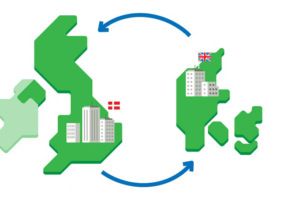News
Business Round-Up: Government agrees Brexit compensation package
This article is more than 3 years old.
More help is also on the way for corona-affected companies and Power-to-X green tech

Brexit still grabbing headlines (photo: Danmarks Statistik)
The government has broad parliamentary approval for a Brexit compensation package worth a total of 1.3 billion kroner.
Help is accordingly on the way for anyone who lost quotas and earnings as a direct consequence of the British exit from the EU.
In particular, Danish fishermen and companies that primarily traded with the UK look set to benefit.
Danish businesses to receive extra help
The government expanded the corona compensation schemes for Danish companies during the festive period. The schemes now include material support for companies temporarily closed, with up to 90 percent available to companies that have closed voluntarily. Seasonal costs for December are also factored in.
Cyber and information security to strengthen
Denmark will introduce new initiatives worth 270 million kroner from 2022-2024 to protect digital infrastructure and IT systems. The strategy includes new requirements for cyber and information security used by the state authorities, as well as a hotline for citizens and businesses.
Denmark investing billions in green fuel conversion
The government is investing 1.25 billion kroner in Power-to-X green technology. The technology converts solar and wind energy into hydrogen power, which can be used as sustainable fuels in ships, aircraft, trucks and heavy industry. Denmark has set its sights on a capacity of 4-6GW of PtX by 2030.
Topdanmark to offer electric car insurance
Denmark’s second-largest insurance company Topdanmark is introducing insurance for electric cars amid the high demand for the green vehicles. Standard packages will cover sustained damage and taxi services when the car runs out of juice. According to De Danske Bilimportører, electric cars accounted for 20 percent of sales in November 2021.
US breakthrough for Danish pharma company’s eczema treatment
LEO Pharma’s treatment for atopic dermatitis has been approved by the FDA, thus opening the door for the Danish pharma company in the US. Adbry is believed to be the first and only available treatment for adults with moderate-to-severe eczema. It will be available in pharmacies all over the US by February.
One-fifth of companies dissatisfied with government
One out of five companies rates the Danish government’s handling of the corporate sector as “bad” or “very bad”, according to a new DI survey. Among the areas of dissatisfaction is the red tape involved in hiring a skilled foreigner.
Lego a better investment than gold, claims study
A new study claims that investing in Lego brick sets is potentially more valuable than choosing gold or even the shares of some large companies. Researchers from the Higher School of Economics in Moscow found that unopened Lego sets appreciated by 11 percent every year from 1987 to 2015.
Danish energy investment in Portugal
Danish company Eurowind Energy is building its first solar project in Portugal, according to The Portugal News. The Triana solar park will begin operating in the third quarter of 2022.
Mærsk acquires Hong Kong logistics solutions provider
Mærsk has acquired Hong Kong-based company LF Logistics Holdings for 3.6 billion US dollars. It believes the acquisition will enable it “to go deep into Asia”. However, the takeover is subject to regulatory approval. LF Logistics is a private company that focuses on providing contract logistics solutions to customers in the Asia-Pacific region.
Danish canner acquired by Faroese fish farming group
The Faroese fish farming group Bakkafrost had acquired 90 percent of the shares of Danish canner Munkebo. The remaining shares will be held by Munkebo general manager Michael Karlsen. Munkebo, based in the city of Munkebo, mostly tins salmon.
Danish start-up raises 4.5 million euros in funding
The fast-growing legal tech company ComplyCloud has received a multi-million investment from SEED Capital, reports Business Wire. Capital worth over 4 million euros will helps the company, which provides advice via digital lawyers, to expand its business out of Denmark, refine its technology and expand its workforce. SEED Capital ´has a rep for investing in innovative Danish tech companies.










































